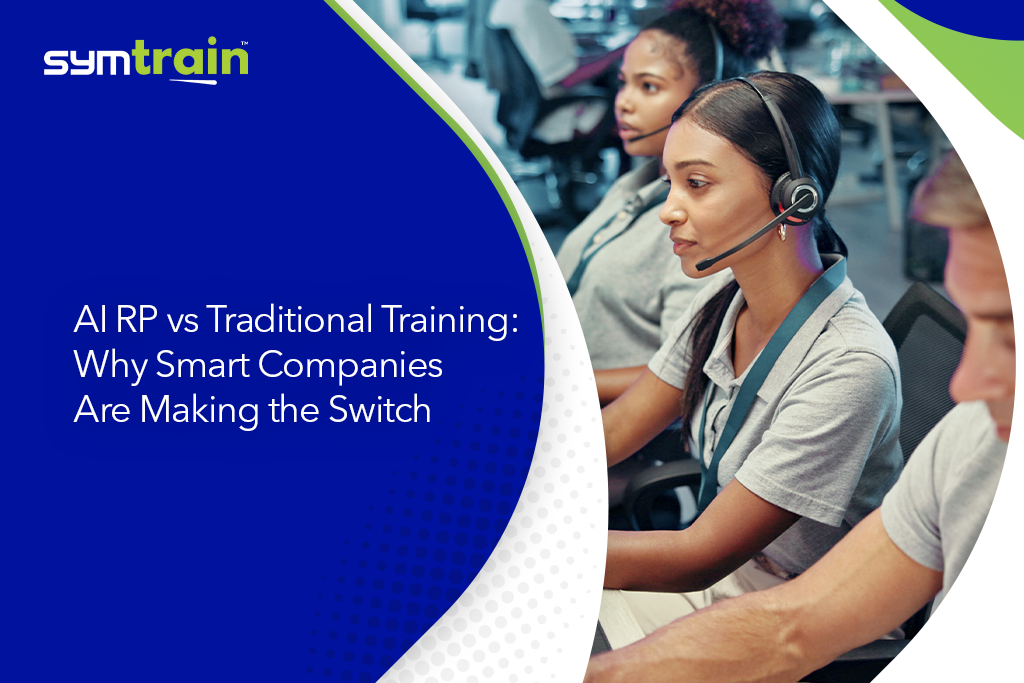AI RP vs Traditional Training: Why Smart Companies Are Making the Switch

The corporate training landscape is experiencing a seismic shift. While traditional training methods have served businesses for decades, forward-thinking organizations are discovering that AI roleplay training delivers superior results at a fraction of the cost. This transformation isn't just about adopting new technology – it's about fundamentally reimagining how we develop human capital in the modern workplace.
Smart companies across industries are abandoning outdated training approaches in favor of AI RP solutions that deliver measurable results, reduce costs, and accelerate skill development. The question isn't whether AI roleplay will replace traditional training methods, but how quickly organizations can make the transition to stay competitive.
The Problem with Traditional Training Methods
Traditional corporate training suffers from fundamental limitations that make it increasingly ineffective in today's fast-paced business environment. These systemic issues have created a training crisis that's costing organizations billions in lost productivity and missed opportunities.
Scheduling Nightmares and Accessibility Issues
Coordinating traditional training sessions across multiple departments, time zones, and work schedules has become a logistical impossibility for many organizations. The average company spends 37% of their training budget on scheduling coordination and venue management rather than actual skill development. Remote and hybrid workforces make in-person training even more challenging, often requiring expensive travel and accommodation costs that quickly spiral out of control.
Traditional training also fails to accommodate different learning schedules and peak performance times. While some employees learn best in the morning, others are more receptive in the afternoon or evening. Fixed training schedules ignore these individual differences, resulting in suboptimal learning outcomes for significant portions of the workforce.
Inconsistent Quality and Trainer Dependence
The quality of traditional training varies dramatically based on the instructor's expertise, presentation skills, and engagement level. Even experienced trainers have off days, and newer instructors may lack the depth of knowledge needed to handle complex questions or scenarios effectively. This inconsistency means employees in different sessions receive fundamentally different training experiences, creating skill gaps across teams.
Trainer availability creates another bottleneck. Top-quality instructors are expensive and often overbooked, forcing organizations to either wait months for availability or settle for less experienced facilitators. This dependency on human resources makes scaling training programs extremely difficult and expensive.
Limited Practice Opportunities
Traditional training typically provides minimal hands-on practice time due to time constraints and group dynamics. In a typical 8-hour training session, individual participants might receive only 20-30 minutes of actual practice time. This limited exposure is insufficient for developing mastery or confidence in new skills.
Role-playing exercises with colleagues often feel artificial and fail to replicate the pressure and unpredictability of real-world situations. Participants may hold back from realistic scenarios to avoid embarrassing their coworkers, reducing the effectiveness of practice sessions.
High Costs and Poor ROI
Traditional training carries enormous hidden costs beyond the obvious expenses of trainers and materials. These include employee time away from productive work, venue rental, travel expenses, and the opportunity cost of delayed skill development. The average organization spends $1,286 per employee annually on training, with traditional methods accounting for 70-80% of these costs.
More concerning is the poor return on investment. Studies show that employees forget 50% of traditional training content within one hour and 90% within a week. This dramatic knowledge decay means organizations are essentially paying full price for temporary skill improvements that quickly disappear.
One-Size-Fits-All Approach
Traditional training programs are designed for the "average" employee, which means they're optimal for virtually no one. Advanced employees find the content too basic and become disengaged, while struggling employees can't keep up with the pace and fall behind. This one-size-fits-all approach wastes everyone's time and fails to address individual development needs.
The lack of personalization also means training programs can't adapt to different learning styles, cultural backgrounds, or specific job requirements. What works for sales representatives may be completely inappropriate for customer service agents, yet traditional programs often use generic content across multiple roles.
Enter AI RP: A Game-Changing Solution
AI roleplay training addresses every major limitation of traditional methods while introducing capabilities that were previously impossible to achieve. This technology represents more than an incremental improvement – it's a fundamental reimagining of how professional development should work.
Unlimited Availability and Accessibility
AI RP training is available 24/7, 365 days a year, eliminating scheduling conflicts and accessibility barriers. Employees can access training during their peak learning hours, whether that's early morning, late evening, or weekend periods. This flexibility is particularly valuable for global organizations with teams across multiple time zones.
The technology works seamlessly across devices, allowing employees to practice scenarios on their computers, tablets, or smartphones. This device flexibility means training can happen anywhere – from the office to home to travel locations – without compromising quality or effectiveness.
Consistent, High-Quality Experiences
Every AI roleplay session delivers the same high-quality experience regardless of when or where it occurs. The AI doesn't have bad days, get sick, or lose enthusiasm for the material. This consistency ensures all employees receive identical training standards while maintaining engaging, challenging scenarios.
Advanced AI systems are trained on vast datasets of expert knowledge and best practices, providing access to top-tier instruction quality that would be impossible to scale with human trainers. The AI can instantly access and apply the latest industry knowledge, regulatory updates, and best practices to every training session.
Unlimited Practice Opportunities
AI roleplay provides unlimited practice opportunities without the constraints of human availability or patience. Employees can repeat challenging scenarios dozens of times until they achieve mastery, something that would be impractical or impossible with traditional training methods.
The AI can generate variations of the same scenario, ensuring practice sessions remain fresh and challenging. This variety helps employees develop adaptability and confidence in handling unexpected situations they might encounter in real-world applications.
Safe Learning Environment
AI RP creates a psychologically safe space where employees can make mistakes, experiment with different approaches, and learn from failures without real-world consequences or embarrassment. This safety encourages risk-taking and creative problem-solving that leads to better skill development.
The private nature of AI interactions eliminates the social pressure and judgment that can inhibit learning in traditional group settings. Shy or introverted employees often perform better in AI training environments where they can focus on skill development without social distractions.
Cost Comparison: ROI Analysis of AI vs Traditional Training
The financial advantages of AI roleplay training become clear when examining total cost of ownership and return on investment over time. While traditional training appears less expensive upfront, the hidden costs and poor retention rates make it significantly more expensive per skill acquired.
Direct Cost Analysis
Traditional training costs include trainer fees ($500-2,000 per day), venue rental ($200-500 per day), materials and equipment ($50-100 per participant), and employee time away from work ($200-400 per participant per day). For a 100-person organization conducting quarterly training sessions, annual costs easily exceed $100,000.
AI roleplay training requires license cost per user.
Hidden Cost Elimination
AI RP eliminates numerous hidden costs associated with traditional training. Travel expenses disappear when training is accessible from any location. Scheduling coordination costs drop to zero when training is available on-demand. Makeup sessions for missed training become unnecessary when employees can access content at their convenience.
The elimination of knowledge decay represents the largest hidden savings. Because AI roleplay provides immediate reinforcement and unlimited practice opportunities, skill retention rates improve dramatically. Organizations save thousands of dollars annually by avoiding the need to repeat training due to poor retention.
Productivity Impact Analysis
Traditional training removes employees from productive work for extended periods, creating opportunity costs that compound over time. A single day of traditional training for 20 employees represents 160 hours of lost productivity, potentially worth $8,000-15,000 in revenue depending on roles and industry.
AI roleplay training can be integrated into normal work schedules through micro-learning sessions and just-in-time training. This approach minimizes productivity disruption while potentially increasing overall performance through continuous skill development.
Scalability Advantages of AI Roleplay Systems
AI roleplay training scales effortlessly from small teams to global enterprises without proportional increases in cost or complexity. This scalability advantage becomes more pronounced as organizations grow and training needs expand.
Horizontal Scaling Capabilities
Adding new employees to AI RP training requires no additional infrastructure, trainers, or scheduling coordination. The same platform that serves 100 employees can instantly accommodate 1,000 or 10,000 users without degradation in quality or availability. This scalability eliminates the traditional bottlenecks that constrain training program growth.
Global expansion becomes seamless with AI roleplay systems that support multiple languages and cultural adaptations. Organizations can provide consistent training quality across international locations without the expense and complexity of deploying human trainers worldwide.
Vertical Scaling Opportunities
AI roleplay platforms can easily expand to cover additional topics, scenarios, and skill areas without starting from scratch. The same system used for customer service training can be extended to sales training, leadership development, and technical skills with minimal additional investment.
Advanced platforms support role-specific customization, allowing the same core system to deliver targeted training for different departments, seniority levels, and job functions. This versatility maximizes platform utilization and investment return.
Demand Flexibility
AI RP systems handle fluctuating training demands without capacity constraints. During peak onboarding periods, new product launches, or regulatory changes, the system can accommodate unlimited simultaneous users without performance degradation or additional costs.
This flexibility eliminates the traditional trade-offs between training capacity and cost efficiency. Organizations can provide comprehensive training during high-demand periods without overinvesting in resources that sit idle during normal operations.
Personalization: How AI Adapts to Individual Learning Styles
AI roleplay's ability to personalize training experiences represents one of its most significant advantages over traditional methods. This personalization goes far beyond simple difficulty adjustments to encompass comprehensive adaptation to individual learning preferences, skill levels, and development goals.
Learning Style Adaptation
AI systems can identify and adapt to different learning styles through behavioral analysis and feedback patterns. Visual learners receive more graphical feedback and scenario descriptions, while kinesthetic learners get more interactive elements and hands-on practice opportunities. This adaptation happens automatically without requiring learners to self-identify their preferences.
The AI adjusts communication styles, pacing, and content presentation based on individual responses and engagement levels. Analytical learners receive detailed explanations and logical frameworks, while intuitive learners get pattern-based insights and big-picture connections.
Skill Level Customization
AI roleplay platforms continuously assess individual skill levels and adjust scenario difficulty accordingly. Beginners start with fundamental scenarios and gradually progress to more complex situations as their competence improves. Advanced users can jump directly to challenging scenarios that match their expertise level.
This dynamic difficulty adjustment ensures optimal challenge levels that promote learning without causing frustration or boredom. The system maintains engagement by keeping scenarios appropriately challenging for each individual's current capabilities.
Career Path Alignment
Advanced AI systems can align training scenarios with individual career goals and development plans. Sales representatives preparing for management roles receive leadership-focused scenarios, while customer service agents interested in technical roles get more problem-solving and analytical challenges.
This career-aligned personalization increases engagement and motivation by connecting training directly to personal professional aspirations. Employees see immediate relevance in their training activities and are more likely to invest effort in skill development.
Cultural and Contextual Adaptation
AI roleplay systems can adapt scenarios to reflect different cultural contexts, communication styles, and business practices. International employees receive training that respects their cultural backgrounds while preparing them for local business environments.
This cultural sensitivity improves training effectiveness and demonstrates organizational commitment to diversity and inclusion. Employees feel more comfortable and engaged when training scenarios reflect their cultural experiences and perspectives.
Measurable Results: Analytics and Progress Tracking
AI roleplay training provides unprecedented visibility into training effectiveness and individual progress through comprehensive analytics and reporting capabilities. This data-driven approach enables continuous optimization and demonstrates clear return on investment.
Real-Time Performance Monitoring
AI systems track detailed performance metrics during every training session, including response accuracy, decision-making speed, communication effectiveness, and skill progression. This real-time monitoring provides immediate insights into individual and team performance trends.
Managers can identify skill gaps and development opportunities as they emerge, rather than waiting for periodic performance reviews or customer feedback. This proactive approach enables targeted interventions and support when they're most effective.
Competency Assessment and Certification
AI roleplay platforms can conduct objective competency assessments and issue digital certifications based on demonstrated skills rather than attendance or test scores. These assessments evaluate real-world application capabilities through realistic scenario performance.
Certification tracking ensures compliance with industry requirements and professional development standards. Organizations can demonstrate employee qualifications to clients, auditors, and regulatory bodies with detailed performance documentation.
Predictive Analytics and Trend Identification
Advanced AI systems use machine learning to identify performance patterns and predict future training needs. The technology can forecast which employees are likely to struggle with specific scenarios and recommend preemptive interventions.
Trend analysis reveals systemic issues that might not be apparent through traditional training methods. Organizations can identify knowledge gaps, process problems, or cultural barriers that impact overall performance and address them proactively.
ROI Measurement and Reporting
Comprehensive analytics enable precise ROI calculations by tracking training costs, time investments, performance improvements, and business impact metrics. Organizations can correlate training activities with customer satisfaction, sales performance, and other key business indicators.
Executive dashboards provide high-level summaries of training effectiveness, while detailed reports support operational decision-making and continuous improvement initiatives. This transparency builds confidence in training investments and supports budget justification.
Industry-Specific Applications
AI roleplay training adapts to the unique requirements, challenges, and opportunities within different industries, providing specialized solutions that address sector-specific needs and regulatory requirements.
Healthcare Industry Applications
Healthcare organizations use AI RP for patient communication training, medical emergency simulations, and compliance education. Medical professionals practice delivering difficult diagnoses, explaining treatment options, and handling family concerns in a safe environment that doesn't impact patient care.
The technology addresses healthcare's unique challenges including life-and-death decision-making pressure, regulatory compliance requirements, and the need for continuous education to keep pace with medical advances. AI roleplay scenarios can incorporate the latest medical research and treatment protocols instantly.
Financial Services Training
Banks and financial institutions leverage AI roleplay for customer advisory training, compliance scenarios, and fraud detection simulations. Financial advisors practice explaining complex products, handling regulatory requirements, and managing customer objections without risking real client relationships.
The high-stakes nature of financial services makes AI RP particularly valuable, as mistakes can have significant legal and financial consequences. The technology provides unlimited practice opportunities for high-risk scenarios that would be dangerous to practice with real customers.
Technology Sector Applications
Technology companies use AI roleplay for technical support training, sales engineering scenarios, and product demonstration practice. Technical support staff can practice troubleshooting complex problems and explaining solutions to non-technical customers.
The rapidly evolving nature of technology makes AI RP ideal for keeping training current with product updates, new features, and emerging technologies. Content can be updated immediately to reflect changes without the delays associated with traditional training materials.
Why Symtrain Delivers Superior AI RP Training Results
When selecting an AI roleplay platform, organizations need a solution that combines cutting-edge technology with practical business focus. Symtrain stands apart from competitors by delivering the fastest implementation, most intuitive scenario creation, and best value in the AI training market.
Industry-Leading Implementation Speed: While other platforms require months of complex setup and configuration, Symtrain's streamlined deployment process gets organizations training within days. Our pre-configured industry templates and automated onboarding eliminate the typical delays that postpone training initiatives and frustrate stakeholders.
Most Intuitive Scenario Creation: Create sophisticated AI roleplay scenarios in minutes using Symtrain's drag-and-drop scenario builder. Non-technical staff can develop custom training situations without programming knowledge or extensive training, making content creation accessible to subject matter experts throughout your organization.
Unmatched Value Proposition: Symtrain provides enterprise-grade AI roleplay capabilities at prices that deliver immediate ROI. Our transparent pricing model eliminates hidden fees and expensive add-ons while providing unlimited access to platform features and ongoing updates.
Smart companies choose Symtrain because we understand that successful AI roleplay implementation requires more than just technology – it requires a partner committed to your training success. Contact our team today to discover how Symtrain can transform your training program and deliver measurable business results.


